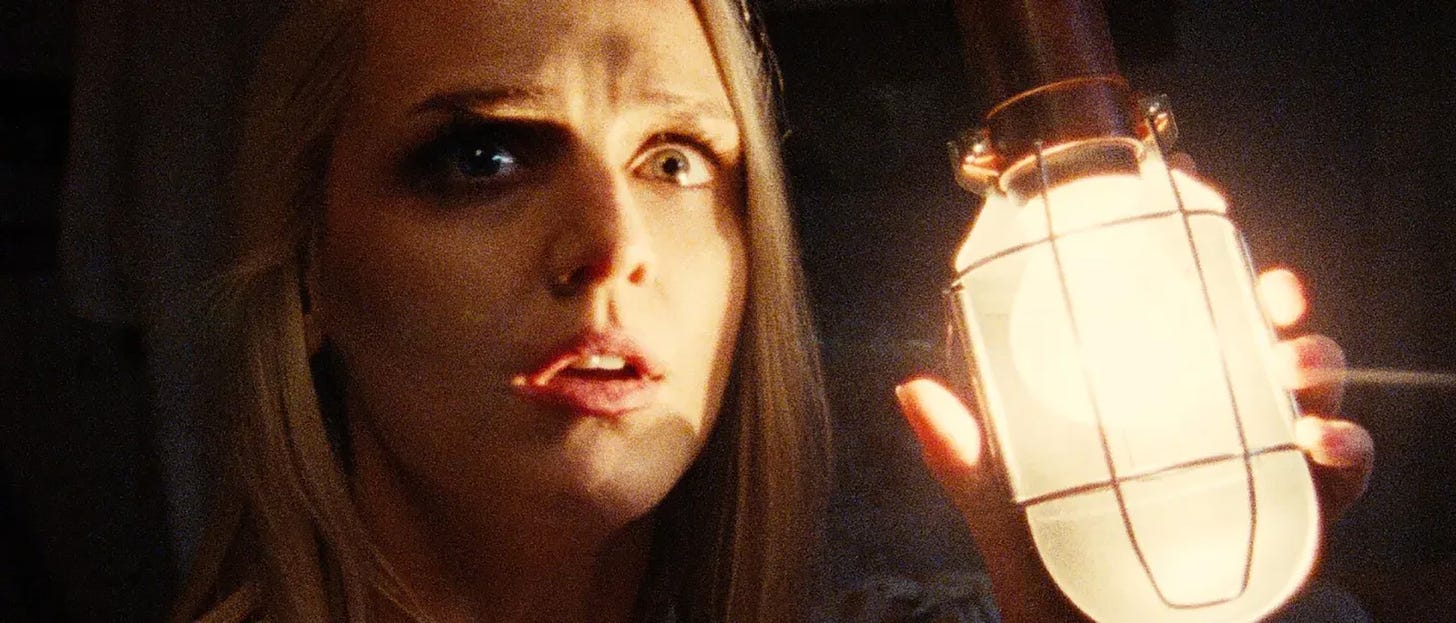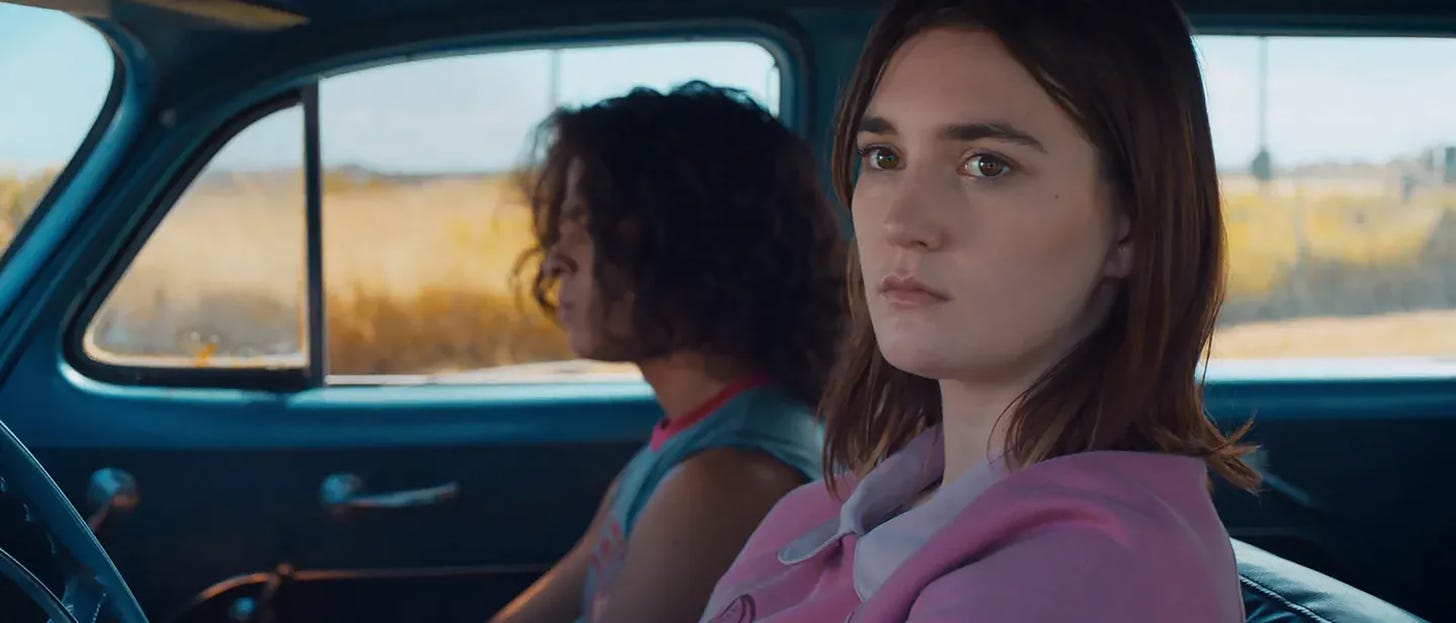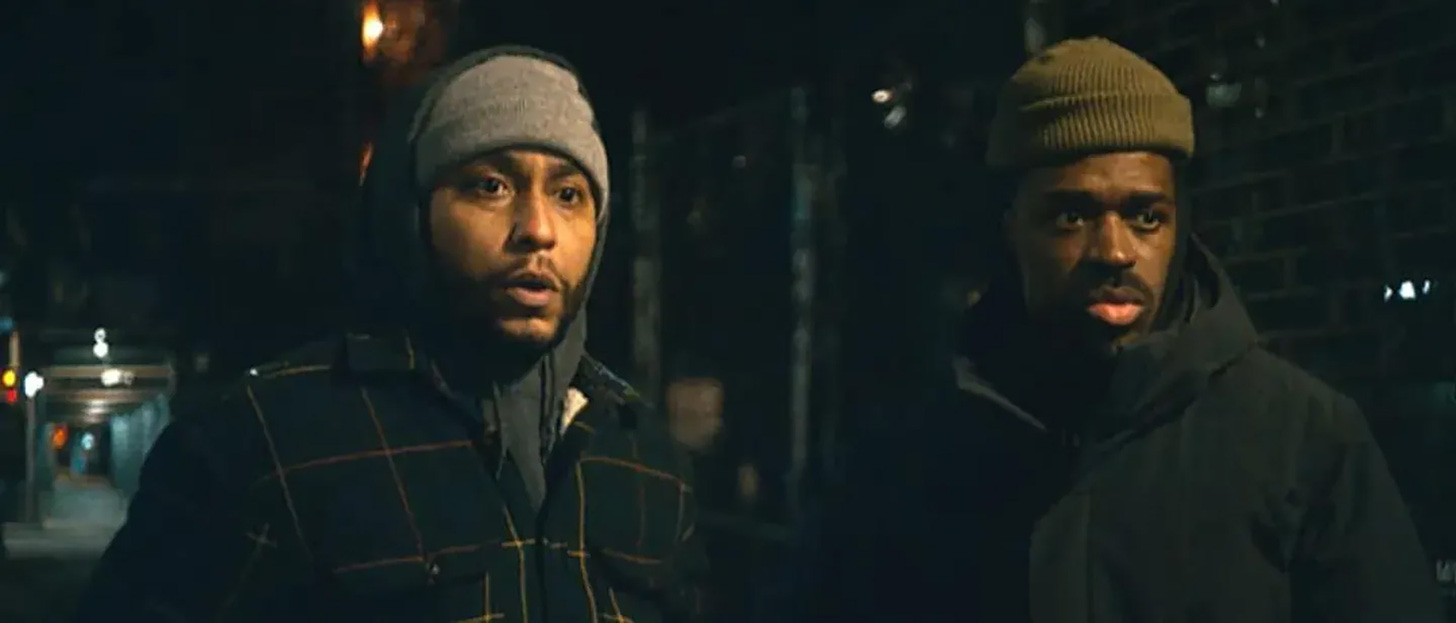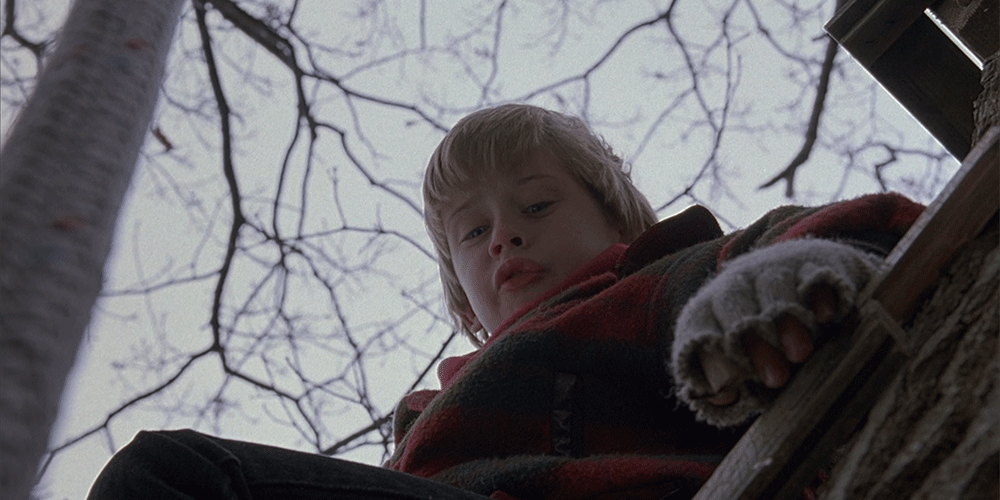Cinema lovers in Western New York have plenty to celebrate this weekend as both the Buffalo International Film Festival (5th-9th) and Rochester’s ImageOut (5th-15th) kick-off. Definitely check both of their schedules if you’re local and able to attend.
I’ve enjoyed both CHASING CHASING AMY (playing BIFF and IO) and THE ORIGIN OF EVIL (playing IO) and was honored to watch the seven domestic narrative features at BIFF as a member of that program’s jury this year (brief thoughts on those titles are below).
What I Watched:
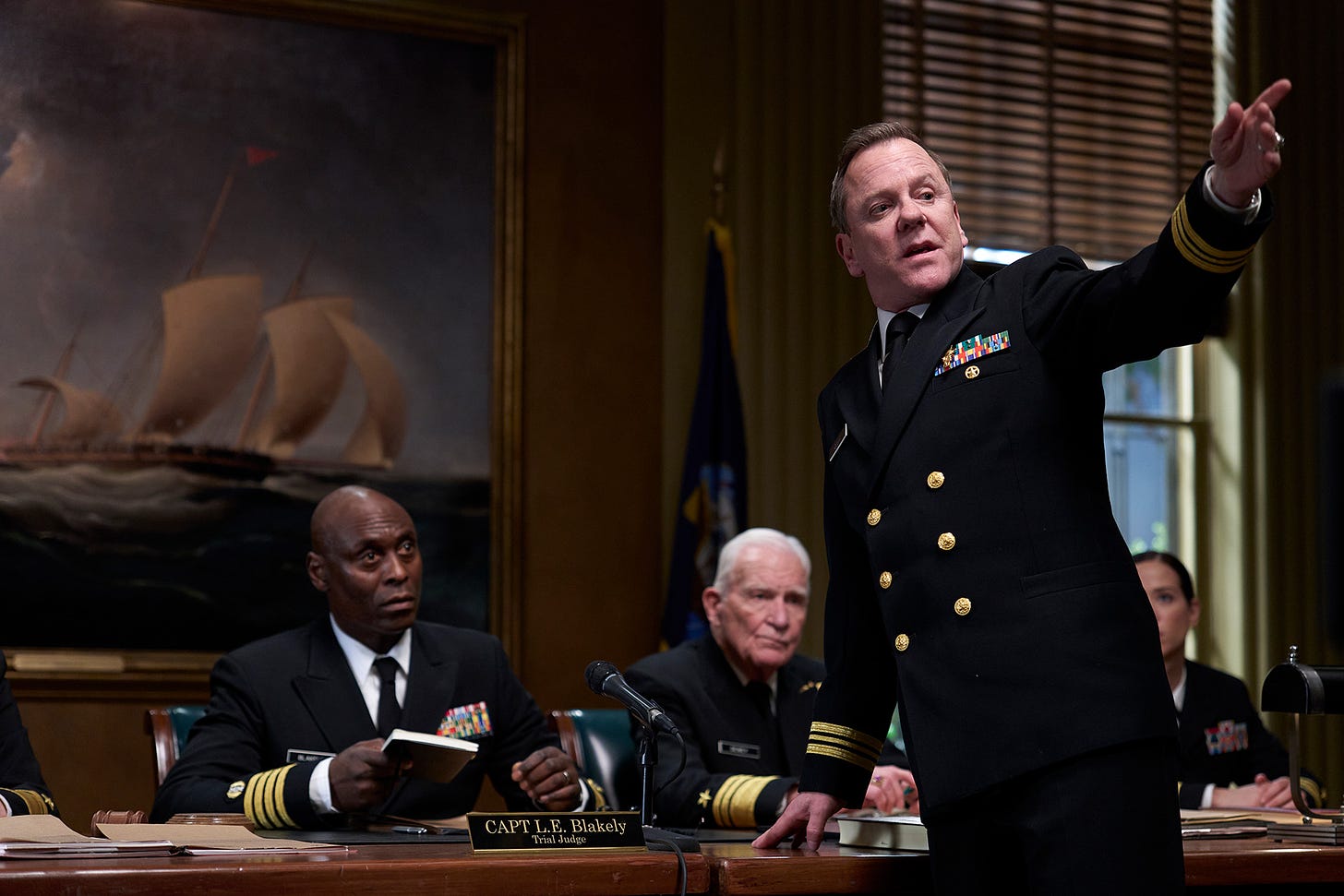
THE CAINE MUTINY COURT-MARTIAL
(now streaming on Paramount+)
Unlike the Oscar-nominated 1954 adaptation of Herman Wouk’s novel THE CAINE MUTINY, William Friedkin’s THE CAINE MUTINY COURT-MARTIAL is based on the author’s play instead. Dealing with just the aftermath of what occurred rather than the entire adventure under Lieutenant Commander Queeg’s rule, it allows its courtroom drama to proceed without our knowing the details soon to be revealed in varying states of truth. Rather than work up to Lieutenant Stephen Maryk’s decision to relieve Queeg of his position, it works backward for us to decide if his choice was sound.
The result is a rousing affair as Maryk’s (Jake Lacy) appointed lawyer (Jason Clarke’s Lieutenant Barney Greenwald) is forced to mold the trial into a narrative that ultimately shifts focus off of the defendant and onto the victim (Kiefer Sutherland’s Queeg). Since no one on the panel deciding guilt (led by the late Lance Reddick’s Captain Luther Blakely) was there, everything hinges on the accounts of those who were. And since that inevitably means it will devolve into a “He said/He said” ordeal, facts become less important than emotions. Whether Maryk should have removed Queeg cannot be proven. Greenwald can only try proving Queeg is a man who could make that necessity plausible.
It starts out quite stuffy with its theatricality firmly affixed to its sleeve to the point where I wondered if it might have been more effective to shoot in real-time as a play without all the cuts. Once we discover what’s really happening (after Blakely asks Maryk if he’d like new counsel due to it seeming Greenwald wasn’t taking the case seriously), however, the whole picks up pace and drama with every subsequent witness. The psychiatrists saying Queeg was fit for duty. The Navy men who all harbor personal grudges against him. And, as a bookend being both witness for the prosecution and later the defense, Queeg himself.
I got really invested in this thing. Well, mostly invested in watching Queeg get proverbially destroyed. The fact Friedkin tacking on the potential to uproot those sentiments along with everything that went into building them in an ending that might cause whiplash makes me wonder if that was the whole point. Because the way in which he gets his audience foaming at the mouth for the blood of the old guard in response to abuses (all within the legal realm of his authority) inflicted on the new guard does make me think I was the one actually on trial. Not Maryk. Not Queeg. Me.
It’s a revelation that has me wanting to watch it again knowing what I now know—details the novel and the original Humphrey Bogart-starring film seem to lay out with little wiggle room as far as the truth is concerned. By shrouding those intentions and making everything filter through Greenwald’s tactics in court, however, all we have here is wiggle room. And it’s easy to pick a winning side, especially since our current political climate has us firmly believing that dinosaurs from bygone eras who are still in control should be removed. It’s easy to make the conflict black and white … and easier still today since nuance is all but dead.
Even so, the speed and force at which that epilogue delivers new evidence is jarring. So much so that I cannot deny it subverts some of the overall success. Maybe that’s a product of my feeling duped, but that isn’t entirely my fault when Friedkin so obviously wanted me to feel that way. All in all, it remains a compelling piece with solid performances and relevant themes. And as a swan song for Friedkin himself, that middle finger of a finale couldn’t be more appropriate. Because we shouldn’t always kill the old guard before dancing on their corpses. Some of us wouldn’t even know how to dance without them.
- 7/10
MISTER ORGAN
(now in limited release)
There’s no big epiphany at the end of David Farrier’s MISTER ORGAN. He hopes one will arrive. All documentary filmmakers do when they set out to craft a story around an enigmatic person or event that has the potential to conjure unforeseen twists and turns along the way. Where Michael Organ is concerned, however, it truly is a case of “what you see is what you get.” As those who talk about him describe, Organ has a creepy, evil aura about him. He will suck you into his orbit and wrestle away control. He doesn’t therefore have to do anything new. Michael has already done enough.
The story’s origins are simple. Lillian Bashford sold antiques at a shop with its own parking area. Whether by her own volition or not, she started to fight back against anyone who dared park in that area after hours. They weren’t taking the spot away from customers—the store was closed. They were simply “infringing” upon her private property. So, she hired a service to enforce a toll. As soon as the driver exited the vehicle, someone would either put a clamp on the car’s wheel or block them in with his truck. And when that driver returned to leave, they’d be forced to pay an exorbitant amount of money to do so.
Farrier, as a journalist, wrote about this human-interest story. It got some play and soon became talked about enough for people to start wanting to see it for themselves. In so doing, these people began to film the man extorting their money—a man revealed as Michael Organ. A man Lillian says she didn’t know personally despite always being seen with him. A man who may or may not be posing as a lawyer sending cease and desist letters in Lillian’s name. A man who served time for stealing a yacht. A man whose name conjures visceral reactions of fear and suffering from all who have known him.
So, Farrier decides to find out more. He ultimately doesn’t have a choice once circumstances put Organ onto his trail as much as the other way around. Why not lean into it and try to exploit Michael’s obvious attention-seeking nature to understand how he ticks? Except this isn’t necessarily a game. Farrier isn’t going to be able to catch him in a lie because he’s pathologically warped to the point of truly believing he isn’t lying. You can see it in his smile and penchant for blaming someone else for his own actions with an “I won’t disclose their name, but I think you and I both know who it is.” This isn’t an exposé as much as a warning to those who know someone like him. Run away. Now.
Maybe that won’t be enough for some, but the testimony from acquaintances and the primary footage Farrier takes with Organ’s permission is extremely captivating. The filmmaker isn’t necessarily falling under his subject’s spell like so many have, but he is suffering from the effects. Narcissistic liars like Michael have an innate ability to make you think you’re going crazy and it’s tough to extricate yourself from the situation as a result. Farrier could have quit at any time, but Organ refuses to let him by both teasing a reveal (“names will be named later”) and insidiously threatening violence with words pretending the opposite.
It’s the kind of story that might need a trigger warning for viewers who have fallen victim to manipulators like Organ. And it’s a journey that can’t help but draw you into its web of deceit—coercive and fatigued alike. Family doesn’t want to be associated with him. Former acquaintances are afraid of retribution just by mentioning his name. This man has his claws in so deep that you literally cannot get a straight answer from anyone except him … as long as you’re able to read between the lines and realize the truth: Michael Organ has done nothing wrong because it was Michael Organ the whole time.
- 7/10
OMOIYARI: A SONG FILM BY KISHI BASHI
(now in limited release)
Any year a Kishi Bashi album is released is a year that the mix cd I make for friends and families during the holidays will include at least one song from it. “Bright Whites” in 2012. “Philosophize in It! Chemicalize With It!” and “Carry on Phenomenon” in 2014. “Can’t Let Go, Juno” in 2016. And “F Delano” in 2019 off the album that shares a name with this film. I had tickets to finally see him perform in Toronto in April 2020—a dream dashed by COVID, probably forever now.
So, it was an easy call to request a screener of OMOIYARI: A SONG FILM BY KISHI BASHI. It’s been four years since Bashi’s (real name Kaoru Ishibashi) last album and the assumption that I would be watching a concert film of sorts was a palatable one due to having missed out on experiencing one in-person. But that’s not what he and co-director Justin Taylor Smith deliver. Yes, we get to see and hear him play some music, but this is very much a journey to reconcile his identity.
What began as a commissioned piece about Executive Order 9066 (Japanese internment during WWII) by Nu Deco Ensemble quickly became an autobiographical history lesson on what it means to be a Person of Color in the United States of America and how little has changed in the decades since that abhorrent act by our government. Bashi sets off from his Georgia home to interview survivors, visit the camp sites, and confront a psychological and cultural conflict of his own stemming from his Japanese-American heritage.
The feature is thus more about contextualizing what happened with what is happening (internment centers for refugees) than the music itself. But there’s still a through-line since what Bashi learns about his home and self is filtered through the melodies. The improvisations he plays at those historical sites by channeling the emotional struggle endured in the 1940s ultimately became tracks on his fourth album a year later. So, this is a process film of sorts too. Omoiyari is a concept album born from a theme of empathy for those innocent men, women, and children.
You also get to meet his equally charismatic parents and his daughter (with some early home video duets from around the time of 151a) while traveling to a few cities (including Japan’s Mie Prefecture, where his father grew up) to catch quick snippets of performances. Add his first time playing at a protest despite starting things off by saying he “isn’t an activist” and you start to see the evolution of self that occurs along this very personal journey across America.
Maybe the whole proves a bit niche in the end, but its surprisingly robust education on EO 9066 and its aftereffects really ensures that its look at Bashi’s life resonates as an example of what it means to be a minority in the US. Watching him point at his high school to say it’s where he learned he was Asian is relatable when I think about my own introduction to realizing I was Arab. There’s a lot to unpack later in life when it comes to assimilation and racism in this country and seeing his real-time acknowledgement of that truth and his gradual radicalization insofar as using his platform to fight for justice inspires.
- 7/10
BUFFALO INTERNATIONAL FILM FESTIVAL 2023
Narrative Feature (Domestic):
EIGHT EYES
(directed by Austin Jennings)
“The dead mend. The living weave.” Cryptic words with occult meaning or pure aesthetic? I lean towards the latter due to the very intentional grain and hammy performances harking back to 70s-era European horror. And since most of those classics aren’t my cup of tea, neither is Austin Jennings’ EIGHT EYES.
That’s not to say it isn’t well-made with some ace practical effects. It’s simply really slow and repetitive en route to a bonkers finale that doesn’t even attempt to ascribe purpose to anything beyond an excuse to deliver a cool montage sequence of vivid imagery portraying the opening of “eyes” onto metaphysical planes beyond time and space. A lot of style, very little substance.
Bruno Veljanovski is fun as Saint Peter, though. He’s our guide into this nightmarish world of whatever the heck is going on. (Think the Sawyer Family if they were telepathic, I guess?) He delivers a winning smile and a ton of charisma while wooing Cass (Emily Sweet) and Gav (Bradford Thomas) into tagging along on his tour of Macedonia and a cutthroat temper once duty trumps artifice.
I just couldn’t care. Cass and Gav’s marriage and well-being are at stake on paper, but they’re mostly pawns to Jennings and Matthew Frink’s script. They facilitate the reveals of “Mama’s voice” and wax masks. If we didn’t have victims, we’d have no reason to visit the lion’s den. And so, in the end, it feels like a trip through a Haunted Horror Night attraction. A long wait building up expectations only to be whisked through five rooms of meticulously orchestrated horror devoid of life.
Its target audience should love it.
FANCY DANCE
(directed by Erica Tremblay)
What begins as a missing persons hunt for Jax’s (Lily Gladstone) sister soon reveals itself to be less about getting back what’s gone and more about accepting what remains. It’s a theme that runs through the entirety of Erica Tremblay’s FANCY DANCE—especially on parental lines with Tawi’s disappearance leaving a thirteen-year-old daughter (Isabel Deroy-Olson’s Roki) alone in its wake. Jax believes that being her aunt will be enough. She’s doesn’t quite understand yet that she must also be willing to take up the job of mom.
How could she, though? What examples had she known growing up? Her mother died when she was a teenager and her father (Shea Whigham’s Frank) left the reservation and his daughters behind. Jax and Tawi became survivors as a result. Running drugs. Doing time. Scraping by. And these are the lessons they’ve imparted on Roki too. So, it’s not until child protective services arrives to place her with Frank and new wife Nancy (Audrey Wasilewski) that Jax realizes Roki had become part of her survival.
Tremblay and co-writer Miciana Alise’s script takes us on a road trip of sorts. Roki joins Jax (without permission and thus legally kidnapped) under the belief they’ll be heading towards the annual powwow to be reunited with her mother. Jax takes her to hopefully unearth the truth of Tawi’s disappearance (the police aren’t paying attention) so she can break the news only when her suspicions of murder are finally confirmed. How they get by on the road (stealing and trespassing) entertains while also shedding light on the systemic racism always forcing their hands.
The end result is a well-told if familiar tale set amongst Native characters caught between culture and country with the usual depictions of bigotry and ambivalence on the part of those ensuring that clash forever keeps them down. It may use the horrors of an American murder epidemic on reservations as its backbone, but it’s really about hope for the future and a desire to right past wrongs and be who your loved ones need you to be. Gladstone is fantastic in the lead role, learning that protection demands honesty. Only then can she be the person Roki truly needs.
NEW STRAINS
(directed by Artemis Shaw + Prashanth Kamalakanthan)
The more “pandemic” films I see, the more I come to realize that most couples truly do not like each other. I look at Kallia (Artemis Shaw) and Ram (Prashanth Kamalakanthan) and wonder: Why? What is it that they like about the other? It’s not personality. It’s definitely not temperament. She doesn’t respect his paranoia about an impending virus-fueled lockdown and he refuses to help her understand it, choosing “selfish tantrum” to make himself feel better instead.
Kamalakanthan and Shaw’s NEW STRAINS (they also write/direct) depicts their characters inevitably losing patience, recognizing their hatred for the other, and succumbing to the disease (a cognitive regression that has adults acting like children). That’s it. Sometimes it’s cutely funny. Sometimes it’s just plain weird. But mostly it’s a healthy dose of second-hand embarrassment for two people who are blind to their circumstances and unlucky in the fact that their much-needed clarity comes at a moment when memory loss erases the lesson.
Shooting on VHS is an interesting choice that lends it a “found footage” aesthetic despite neither holding the camera. So, are we supposed to be the filmmaker? Are we intruding on their space somehow? Or is it a play for manufactured nostalgia? Most scenes also end with a quick zoom towards the texture of a painting or wallpaper—a tick I have zero answers for. It plays like a move for comedic effect, but just comes off as strange. I guess that’s par for the course, though. NEW STRAINS approaches comedy and pathos, but ultimately exists in a state of perpetually restrained chaos.
ONLY THE GOOD SURVIVE
(directed by Dutch Southern)
Sheriff Cole Mack (Frederick Weller) says it best when he stops the storyteller at the center of Dutch Southern’s ONLY THE GOOD SURVIVE to question whether what he’s hearing (and what we’re watching) is a comedy or a horror. Brea Dunlee (Sidney Flanigan) responds matter-of-factly that her tale is neither. It’s simply the truth. Except, of course, that it’s not. At least not objectively. She wasn’t really there for all of it. Her wild memories might have logical explanations. And there’s zero evidence to corroborate anything she’s said.
That’s exactly why this THE USUAL SUSPECTS riff is so entertaining. If Mack can’t believe anything Brea says, neither can we. And the more we start to see alternative versions hypothetically unfold or witness a new romance-fueled embellishment accompanied by brightly animated drawings like those in her scrapbooked “family album,” the more we wonder if Brea can believe herself too. Because all they were supposed to do was steal a few priceless coins from an elderly couple while they weren’t home. A baby-sacrificing cult wasn’t part of the plan.
More than just letting Brea be an unreliable narrator, however, Southern writes Mack as provocation. He wants answers and he’s willing to shatter all illusions she might have about her boyfriend (D'Pharaoh Woon-A-Tai’s Ry) and his tempestuous cohorts Erve (Will Ropp) and Dev (Darius Fraser). Maybe they were using her. Maybe fear has her seeing things that aren’t real. Maybe the shock of their deaths (presumed since Mack’s deputies have yet to find anyone else after she came running into the street screaming) has tilted her equilibrium.
The pieces eventually fall into place as perspective, intent, and time shift to ensure we know only what’s necessary for the next revelation to hit with maximum impact. It’s a quirky, witty script that moves at breakneck speed whenever anyone but Brea is talking so that each character gets their moment of cool, casual badassery to sell the idea that they are heroic regardless of intent or fate. That spotlit canonization coupled with the sheer absurdity of Brea’s account means everything (even Ry’s “red herring” shirt) is as much a distraction as crucial bit of context.
POUNDCAKE
(directed by Onur Tukel)
The best part of provocateur Onur Tukel’s latest film POUNDCAKE is that he makes sure the cis white men falling victim to the titular serial killer are “beyond reproach” (until the body count starts piling up and the assholes get lumped in as collateral damage). One of them even stopped watching Louis CK because of #MeToo … and he loved Louis CK. If that’s not an ally, I don’t know what is.
I jest. So does Tukel. And his jokes are just as dumb because that’s part of the charm. Anyone familiar with the filmmaker’s career knows his dialogue-heavy, quasi-political debates are generally absurd, but they’re also entertaining due to that silliness being born out of the characters. We laugh at them because they really are idiots. Pompous. Ignorant. Oblivious. They talk a big game only to be put in their place … if they don’t double-down and put themselves there first.
POUNDCAKE is chock full of taboo. Not because its gimp mask-wearing, chain-wielding murderer is sodomizing white men to death, but because the rest of the world either ignores it or laughs. Why? Because they aren’t perfect either. A Black family confronts homophobia. A heterosexual couple questions notions of “normalcy.” A Filipino woman calls everyone out for racism without admitting her own. Comedians discover their complicity to minimizing hate speech. Etc. Etc.
Despite its desire to shock, however, it mostly earns a wry smile. Many of its themes inevitably get confused before the end too—an issue exacerbated by how overt Tukel is at bludgeoning us over the head with them before slipping up. But it is funny. And while most laughs result from the sheer stupidity of the premise, that’s intentional. The point gets made and truths get reinforced. No one is going to learn anything from it, but they’ll surely nod their heads in agreement while telling themselves, “See, I am a good one.”
SCRAP
(directed by Vivian Kerr)
Vivian Kerr’s SCRAP holds up well after a rewatch. Really great character work that never diminishes the complexity of emotion we all experience no matter what our current circumstances may be. Here are my thoughts from earlier this year:
“It's an important message told with a wealth of empathy that never disappears even as Beth spirals deeper and deeper into depression and denial. It's also an honest portrayal of desperation.” – Full thoughts at HHYS.
UNDER THE INFLUENCER
(directed by Alex Haughey)
After ten years of making a name for herself as a YouTube influencer, Tori (Taylor Joree Scorse) is starting to realize this latest dip in engagement might be more than the result of a refreshed algorithm. She’s older now and yet her audience is still the same age. Without legacy engagement and, worse, with backlash from fans who evolved without her, she’s mostly spinning her wheels while jumping on the latest trends regardless of her own interest in them. The system dictates her actions.
Alex Haughey’s UNDER THE INFLUENCER touches on some interesting concepts where identity is concerned by forcing its lead character to confront the reality that she doesn’t know who she is anymore. Spending that much time as a persona takes its toll, especially when you must be “on” 24/7 so as not to risk attracting trolls. Now should be the moment to take a big swing and yet Tori is terrified at the prospect. She cannot acknowledge that the gains of becoming a real person again are worth more than preserving the popularity that remains.
We get a bit of everything where this world is concerned. Tori is judged on the street as not being a serious person due to the façade. Former colleagues exploit her current predicament for personal engagement. Celebrity has isolated her from understanding the truth about her own talent. And it all moves towards an inevitable on-screen maelstrom of emotion that proves an earlier Tarot card reading’s ambiguous response to the “Death” card correct. Because every end is a beginning. And honesty is much more rewarding than parasocial relationships.
The third act is a super earnest fantasy that ensures the movie’s messaging is blatantly expressed for those who weren’t paying attention, but it’s also quite charming and hopeful in its homage of BEFORE SUNSET sentimentality. And despite initially feeling out-of-place, that shift is kind of the point. We’re exiting the simulacrum alongside Tori. We’re watching her step into an unknown chapter of existence where she can stop hiding from herself. It’s a wholesome and poignant realization performed well by Scorse to remind us that our biggest obstacle in life is too often ourselves.
Cinematic F-Bombs:
This week saw THE DEEP END OF THE OCEAN (1999), EIGHT MEN OUT (1988), THE GOOD SON (1993), SALT (2010), and WHAT TO EXPECT WHEN YOU’RE EXPECTING (2012) added to the archive. That’s one PG f-bomb (EIGHT MEN OUT) and an R-rated one too (THE GOOD SON). It’s fascinating to see how the MPAA didn’t mind the word so soon after giving birth to the PG-13 rating (BEETLEJUICE is another 1988 PG instance) and how it wasn’t such a huge part of filmmakers’ vocabulary in the twentieth century either. cinematicfbombs.com
New Releases This Week:
(Review links where applicable)
Opening Buffalo-area theaters 10/6/23 -
THE EXORCIST: BELIEVER at Dipson Amherst, McKinley, Flix & Capitol; AMC Maple Ridge & Market Arcade; Regal Elmwood, Transit, Galleria & Quaker
MISSION RANIGANJ at Regal Elmwood
THE ROYAL HOTEL at North Park Theatre (begins 10/10 in late show slot); Regal Quaker
RULES RANJAN at Regal Elmwood
SHE CAME TO ME at Regal Transit & Galleria
SHELTER IN SOLITUDE at Regal Transit & Quaker
STRANGE WAY OF LIFE at Regal Transit (Daily at 12:45pm only)
THANK YOU FOR COMING at Regal Elmwood
“The film intentionally plays with preconceptions and cultural imperatives to shield us from a third and more important conclusion: that happiness isn't dependent on anyone other than yourself.” – Full thoughts at The Film Stage.
WHEN EVIL LURKS at Regal Elmwood, Transit, Galleria & Quaker
Streaming from 10/6/23 -
BALLERINA – Netflix on 10/6
DEADLY INVITATION – Netflix on 10/6
FAIR PLAY – Netflix on 10/6
PASSAGES – MUBI on 10/6
“PASSAGES works so well and feels so refreshing because it flips the usual redemption formula. Instead of teaching Tomas the error of his insidiously domineering way, it opens the eyes of his victims (and ours).” – Full thoughts at HHYS.
PET SEMATARY: BLOODLINES – Paramount+ on 10/6
THE CAINE MUTINY COURT-MARTIAL – Paramount+ on 10/6
TOTALLY KILLER – Prime on 10/6
V/H/S/85 – Shudder on 10/6
THE MILL – Hulu on 10/9
MR. DRESSUP: THE MAGIC OF MAKE-BELIEVE – Prime on 10/10
NO ACCIDENT – Max on 10/10
AWARENESS – Prime on 10/11
ONCE UPON A STAR – Netflix on 10/11
IN MY MOTHER’S SKIN – Prime on 10/12
MONSTER INSIDE: AMERICA’S MOST EXTREME HAUNTED HOUSE – Hulu on 10/12
Now on VOD/Digital HD -
AFTER EVERYTHING (10/3)
AND THEN COME THE NIGHTJARS (10/3)
THE EQUALIZER 3 (10/3)
THE JESTER (10/3)
LOVE LIFE (10/3)
“Jealousy isn't what Fukada is interested in pursuing. He's focusing upon forgiveness instead. Not for the other's transgressions or unspoken feelings, but for themselves.” – Full thoughts at HHYS.
THE MEAN ONE (10/3)
THE NUN (10/3)
PERPETRATOR (10/3)
ROBE OF GEMS (10/3)
“Robe of Gems isn't an easy film. Its harrowing content is devoid of optimism and its pacing ensures we wallow in the resulting suffering even if very little of it is actually shown on-screen.” – Full thoughts at The Film Stage.
BUCK ALAMO (10/6)
“A sweetly sorrowful tale of a man who simply cannot help himself from tilting reality. It's better to dream in color than endure the cost of your actions in black and white.” – Full thoughts at jaredmobarak.com.
DESPERATION ROAD (10/6)
MONSTERS OF CALIFORNIA (10/6)
PASSAGES (10/6)
“PASSAGES works so well and feels so refreshing because it flips the usual redemption formula. Instead of teaching Tomas the error of his insidiously domineering way, it opens the eyes of his victims (and ours).” – Full thoughts at HHYS.
THE ROAD DOG (10/6)
VINDICTA (10/6)
YOUR FRIEND, MEMPHIS (10/6)








